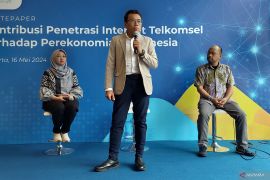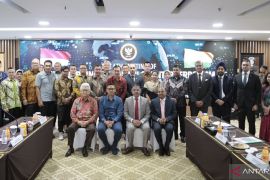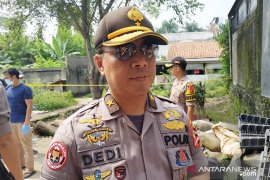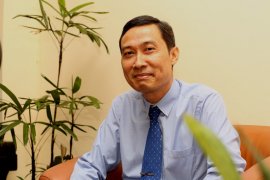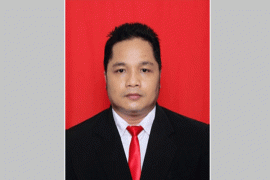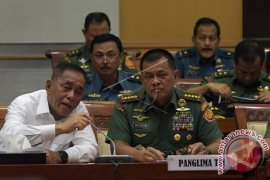The US is now worrying about the development of Islamic State of Iraq and Syria's (ISIS) militant radical network in South East Asia. ISIS manages to collaborate with some local networks that have existed in South East Asia.
All this time, ISIS has historically created partnership with some militant groups in the World, including in Egypt, Libya, and Nigeria. The US Foreign Ministry Counter Terrorism Coordinator, Justin Siberell, mentioned that ISIS is increasingly willing to expand its influence to South East Asia region.
Siberell also emphasized that the militants from South East Asia fighting for ISIS in Iraq and Syria are deployed in one unit called "Khatibah Nusantara". Their existence will pose some significant threats when they return to their respective countries.
This statement was delivered by Siberell in late August after his visit to Bali to attend the cross border counter terrorism summit. After Bali, Siberell also visited Jakarta, Malaysia, and Singapore before finally take off for Washington, US.
So far, there were only some small scale attacks and some successfully stopped plan of attacks involving ISIS' network in South East Asia region. However, some observers are worried about the more effective ISIS' network in the region.
Previously in January 2015, The Star mentioned ISIS as the most dangerous terrorist network. It was established by Abu Bakr al-Baghdadi and controlled most regions in Iraq and Syria. They spread violence and brutal interpretation of Islamic law in those two regions including in many cities in Iraq and Syria.
Al-Qaeda was formed in 1988 by Osama bin Laden who then was dead in an operation by US Navy Seals. This group was haunted after the attack on 11 September 2001. After the death of Osama, this network was led by Ayman al-Zawahiri from Egypt. ISIS was formerly a part of the network, but it was excluded from Al-Qaeda due to its too extreme brutality.
Al-Qaeda in the Arabian Peninsula (AQAP) was formed in 2006 by a unification of Yemen and Saudi wings of al-Qaeda and also known as al-Qaeda in Yemen. This was considered as the most dangerous chapter of al-Qaeda. It was responsible of the Charlie Hebdo attack in Paris on 7 January 2015.
Taliban Afghanistan was established in 1994 under Mullah Mohammed Omar leadership. He was a commander as well as a spiritual leader. The main goal of this organization is to establish an Islamic state in Afghanistan. This group ruled Afghanistan in 1996- 2001 period and implemented strict sharia Law. After the US withdrew its troop from Afghanistan, Taliban Afghanistan successfully made some progress in Afghanistan.
Taliban Pakistan or also known as Tehreek-e-Taliban Pakistan (TTP) attacked Army Public School in North-West Peshawar Pakistan on a working day, and slaughtered 148 people including 132 children in a deadly attack in the country. This group was also responsible for the shooting of the Nobel Peace Prize winner, Malala Yousafzai. It operates around the semi-autonomous zone in North-West Pakistan nearby Afghanistan border. Its current leader is Maulana Fazlullah.
Al-Nusra Front or the Syrian People Defender Front is also known as al-Qaeda in Syria. Its establishment was posted online in 2012. It aims to replace President Bashar al-Assad regime with an Islamic State. This group actively involves in supporting Syrian rebellion group and attacks any target affiliated with Syrian Government. It is considered as a terrorist organization by Western countries, Saudi Arabia, Turkey, and United Arab Emirates.
Boko Haram intends to forcefully implement 'the hard form of Islamic Law' in Nigeria. Boko Haram means 'Western education is a sin". This group forbids the Muslim to get involved in any western related activity, including voting in election, wearing shirts and long pants, or receiving secular education. In January 2015, they conducted deadly slaughtering in Baga, a city in the North East Nigeria. Around 2.000 people were dead according to Amnesty International. Boko Haram controls about 20.000-mile square region in North-West Nigeria, reported by The Telegraph in January.
Jemaah Islamiyah (JI) is an al-Qaeda chapter in Southeast Asia. It was responsible for the Bali bombing in 2002 with 202 death tolls. It operates in Indonesia and was established in early 1990 in order to establish a caliphate in the region. It has many prominent figures such as the spiritual leader Abu Bakar Bashir, a bomb maker Umar Patek, and a leader in Singapore Mas Selamat Kastari, who have been arrested. Its network has broken since 2002, but some attacks last year were still affiliated to it.
Malaysian security authority identified 4 new terror groups that was known for their short names, BKAS, BAJ, Dimzia, and ADI. Most of them have pledged to ISIS.
Abu Sayyaf is a criminal gang operating in Sulu that often kidnaps people along Sabah coast and nearby areas for ransom. It was established in 1990 funded by al-Qaeda. This group based in Basilan and Sulu island was blamed for the worst terror attacks in the Philippines history, including some bombings and massive kidnappings of some Christians and foreigners. This group has long had relationship with al-Qaeda and recently pledged to ISIS.
Lashkar-e-Taiba (LeT) was responsible for the Mumbai attack of 2008 resulting 166 death tolls. Since the attack, this group transformed into Jamaat-ud-Dawa (Jud).
Strength and Weaknesses
In its current development, ISIS in Iraq is now only controlling Mosul City after City of Ramadi and Fallujah were taken back by Iraqi armed forces assisted by coalition. Meanwhile in Syria, it only controls City of Raqqa and Al-Bab after it failed to defend Manbij and Jarablus city.
Not only that, many of ISIS' high rank officials have already died such as Abu Omar al-Shishani (the number 2 person in ISIS' structure), Abu Muhammad al-Adnani alias Taha Sobhi Falaha (the third person), Haji Hamzah (Al Baghdadi's hand in Al-Anbar Province, West Iraq) and Abbu Sayyaf (ISIS' Minister of Oil) Regardless the defeats, ISIS still has power.
According to the UN investigation, the radical militants of ISIS use mustard gas as weapon. Reports from Joint Investigation Mechanism (JIM) found out that the Syrian regime has dropped chemical weapon in two villages in Idlib Province, in Talmenes on 21 April 2014 and in Samin on 16 March 2015.
Some worrying indications suggest that ISIS is developing chemical weapon. Some reports even suggested that ISIS has used that kind of weapon in Iraq and Syria.
For instance, ISIS launched a deadly gas attack to Syrian armed forces nearby City of Deir Ezzor. Meanwhile, on last 9 March, ISIS' gas attack was launched in City of Taza, Iraq. The attack killed 3 children and hurt more than 1.500 people with various wounds from burns, rashness, until respiratory disorders.
The Chair of Organization for the Prohibition of Chemical Weapons (OPCW) Ahmet Uzumcu said, the fact finder team has found some evidence regarding the use of sulfur mustard or mustard gas in ISIS’ attacks in both countries. This mustard gas is a dangerous chemical weapon that can create wounds on the skin and respiratory tract.
In February 2016, the Director of Central Intelligence Agency (CIA) John Brennan told the local media CBS News that ISIS' members have the capacity to create small amount of poisonous chlorin and mustard gas.
The capability of this terrorist network gets more alarming because this group uses cyber media to get recruited and to recruit including to access training materials and to plan its actions. Cyber world has become a new arena for the terrorist movement, thus the mapping of terrorist network does not necessarily have to related to the big group like ISIS and al-Qaeda, yet there are also some groups and individuals that are also similarly radical and dangerous that appear only from the interaction in social media.
The mode of terrorist activities in cyber world is now getting more complex. ISIS has effectively used social media to recruit the young generation. In order to improve the technical skills of the recruits, it also trains them through social media. They who depart for Syria and Iraq for fighting might return home and create similar movement.
Expanding Network
The concern of Justin Siberell is reasonable to some extent. It comes up due to the indication that a Malaysian ISIS fugitive is believed to hide in South Philippines and plan to create an official faction of ISIS in Southeast Asia. This faction aims to unite terrorist cells in Malaysia, Indonesia, and the Philippines. This will include Abu Sayyaf Group (ASG) and other terrorist groups in the region.
According to Head of Counterterrorism Division of Malaysia Datuk Ayob Khan Mydin Pitchay to Strait Times, he is worried about the plan of Malaysian militant group to create ISIS terrorist network in Southeast Asia.
Some of them are Mahmud Ahmand, former lecturer in Malaya University also known as Abu Handzalah, who is actively joining the training of ASG and takes part in terrorist operation in South Philippines; Mohd Najib Husen, an owner of a retail shop; and Muhammad Joraimee Awang Raimee who was former staff of Selayang Municipal Council.
These three people wish to unite some militant groups in Southeast Asia such as Abu Sayyaf and Jemaah Islamiyah into one union under the Islamic State.
Since 2000, there has been five-time increase of number of people getting killed by terrorism. Although there was a small decrease since 2007 onwards, this numbers soared again when the Syrian civil war was started.
Meanwhile, terrorist threat in Indonesia is the impact of domestic and global pressures. Global pressure is dominated by global political ideas contestations triggered by the US' military strategy to strengthen its political economy position in the future through the "Rebalancing Asia Pacific" issue.
The domestic pressure, on the other hand, comes from the radicalization of religion including terrorist action escalation due to the existence of ISIS' sympathizers, militant groups, and the terrorist and former terrorist network. Also, there are still strong support in terms of fund that is identified coming from Turkey, Australia and some Middle East countries including the surge of illegal migrant coming into Indonesian territory.
According to Global Affairs Foreign Terrorist Fighter, Indonesia is one of personnel supplier for ISIS with around 300 people until January 2016. Meanwhile, other countries with most people joining ISIS are namely Tunis (6.000 people), Saudi Arabia (2.275 people), Jordan (2.000 people), Russia (1.700 people), France (1.550 people), Turkey (1.400 people), and Morocco (1.200 people). However, according to RI Government data from various sources, there are around 500 Indonesians joining ISIS.
In Regional Risk Assessment on Terrorism Financing 2016 South East Asia and Australia Forum in Bali, it was mentioned that Indonesia is included in extremely threatened country. Until now, there have been 568 Indonesians going to Syria and Iraq to join ISIS. 183 of them have returned. This number is the highest compared to Malaysia with 73 people and Australia with 110 people departing for Syria and Iraq. Besides, there also 11 active terror groups in Indonesia.
What should we do?
According to theory of threat developed by lyota and Lloyld formulated as T=IxCxC, in order to stop or minimize the threat, intention (I) must be eliminated and capacity (C) must be weakened or the circumstances (C) that can trigger it must be minimized.
Reducing intention of the terror group is very impossible thus we have to have someone inside to at least know in advance their plan of action. Meanwhile, weakening its capability is likely possible by creating some working groups to handle terrorism in cyber world, creating special court or preparing special judges for terrorist trials, involving military element in handle the terrorists, giving extra authority to BIN to arrest terrorist suspects, cancelling the citizenship status of those joining terror group and their family, and so on.
The most possible action is minimizing the trigger or the circumstances that lead to the birth of a terror group by developing or bringing back silaturahim (Islamic concept to be friend and care about each other) and siskamling (society patrol), as well as developing multicultural education to prevent narrow understanding and intolerance.
Also, the political and economic policy must not bring harm to any group in society especially those prone to be radicalized. Last but not least, the state must be present amongst the people and become a role model as well as build the trust. It means, it is not acceptable if among the society with very simple life, those in legislative, executive, or judiciary abuse their power.
*) The writer was earned his master at University of Indonesia (UI). Previously, he was earned bachelor degree at University of Jember (Unej) in East Java.
The Expansion of Terrorist Network, What Should We Do?
Selasa, 20 September 2016 9:17 WIB
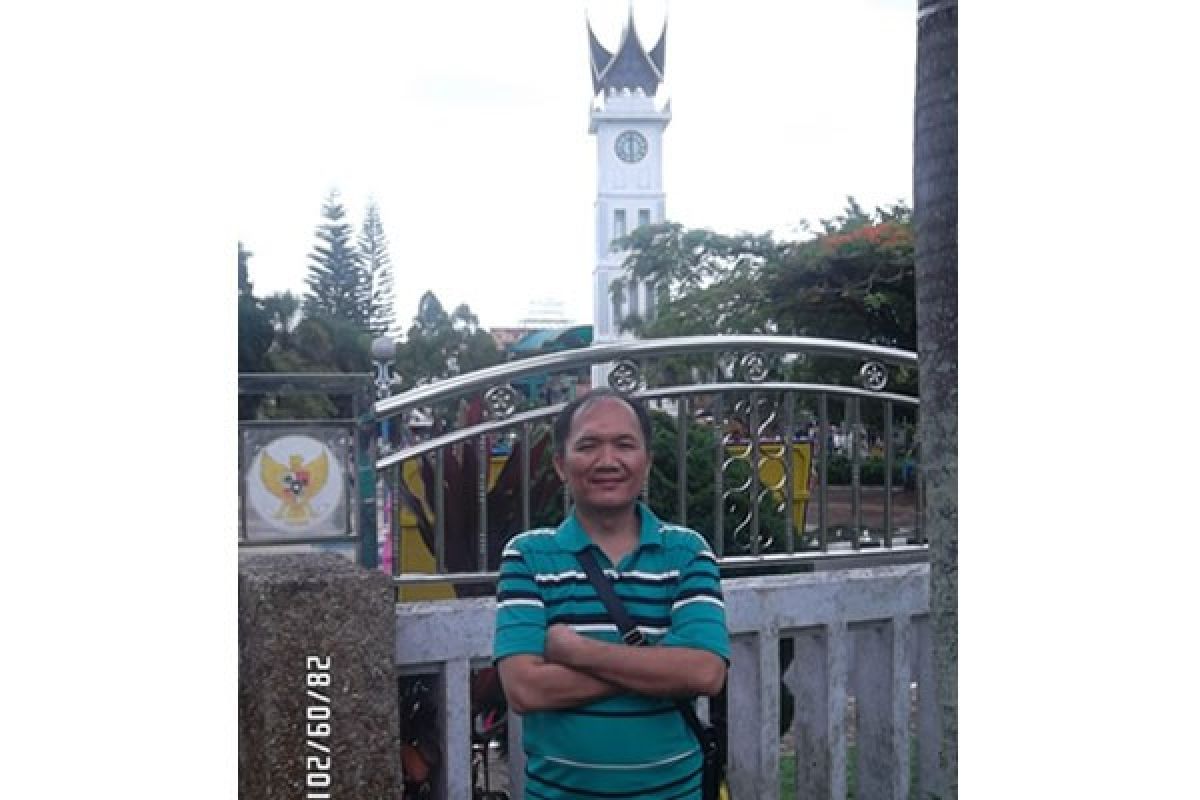
Toni Ervianto. (ANTARA FOTO/Dokumentasi Pribadi/Dok).
The state must be present amongst the people and become a role model as well as build the trust.


